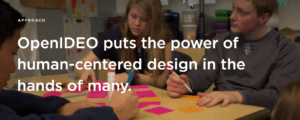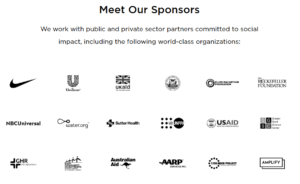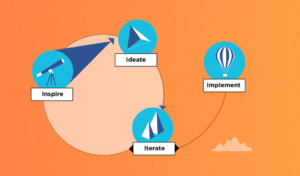OpenIDEO: Can the power of crowds solve our toughest social problems?

Tapping into the design thinking methodology that was pioneered by its parent company, IDEO, OpenIDEO puts this powerful tool and methodology in the hands of many in an attempt to ignite even more innovation among some of the world’s most complex issues. Since 2010, OpenIDEO has successfully engaged communities across 202+ countries and spurred 16,000 “ideas for good.”
Tapping into the design thinking methodology that was pioneered by its parent company, IDEO, OpenIDEO puts this powerful tool and methodology in the hands of many in an attempt to ignite even more innovation among some of the world’s most complex issues. Since 2010, OpenIDEO has successfully engaged communities across 202+ countries and spurred 16,000 “ideas for good.”[1]
Individuals who discover the platform and want to engage have three options for participation – challenges, events, and alliances. All three approaches offer access to IDEO resources and design thinking methodology, access to funding and design support, and connection to a global community, but each with varying degrees of co-location, expertise, guidance, and community immersion.
On the participant side of the platform, OpenIDEO does not filter or screen any of their participants; they value diverse opinions, and therefore encourage anyone who is exciting about teaming up to tackle these big issues to participate. Due to the pro-social nature of the work and high-profile sponsors, OpenIDEO naturally attracts a subset of participants that are highly engaged and motivated to share the platform with their friends. Both same-side (I want more of my friends and co-workers on the platform so we can work together on these problems) and cross-side network effects (more enticing projects attract more participants) help to perpetuate and grow this motivated user base, despite there being no prize or clear benefit for winning a challenge.
The other side of the platform, of course, is the sponsors of the projects. The sponsors span many industries and sectors and play a multi-faceted role on the platform – they offer financial support for testing and prototyping ideas, generate many of the project ideas, and share their professional networks and technical resources. Similar to the participant side of the platform, OpenIDEO doesn’t appear to be doing anything to actively acquire sponsors. Instead, for the sponsors, joining OpenIDEO as a sponsor allows them to join an elite group of recognized sponsors and gives their company positive PR.
Perhaps OpenIDEO’s greatest advantage in bringing crowdsourcing to the social impact space is its relationship with parent company IDEO. Not only does the obvious association in the naming of OpenIDEO help drive its legitimacy as an organization, but OpenIDEO also benefits from many of the shared expertise and knowledge resources that it can tap into. Additionally, because OpenIDEO sits within the broader IDEO organization with a philanthropic intent, there appears to be no pressure for profits, therefore relieving OpenIDEO.
While this association and support from IDEO is mostly a strength, there are certain risks that this relationship poses. IDEO is a fundamentally a consulting business where they partner with clients to apply the “design thinking” magic. However, if they continue to push this crowdsourcing method of applying design thinking beyond the boundaries of just “social good,” they could undercut their core consulting business as more companies instead turn to leverage the crowds instead.
The other key risk that I believe OpenIDEO will really have to nail to make crowdsourcing social good is to become experts in facilitating virtual, globally-dispersed teams. This is a challenge for many businesses in general, yet is even more complex for OpenIDEO given the complexity of the challenges they are working on and the nature of every team that is formed is new to working together and may have varying expectations for the engagement.
Sources:
https://sourcingjournalonline.com/nike-circular-innovation-challenge/
http://bigthink.com/design-for-good/openideo-collaborative-design-thinking
[1] https://www.openideo.com/approach





